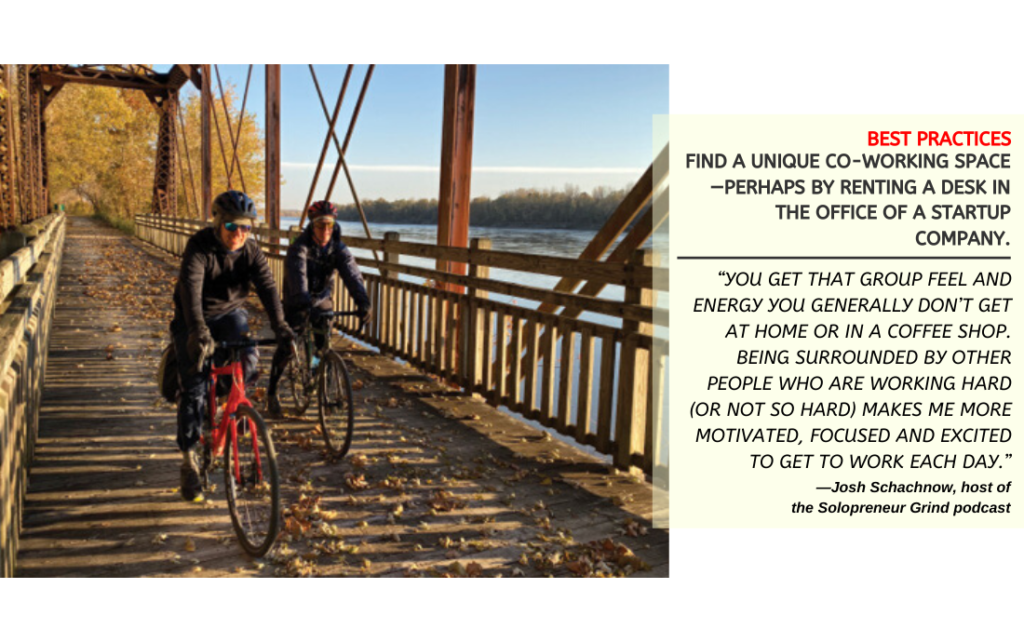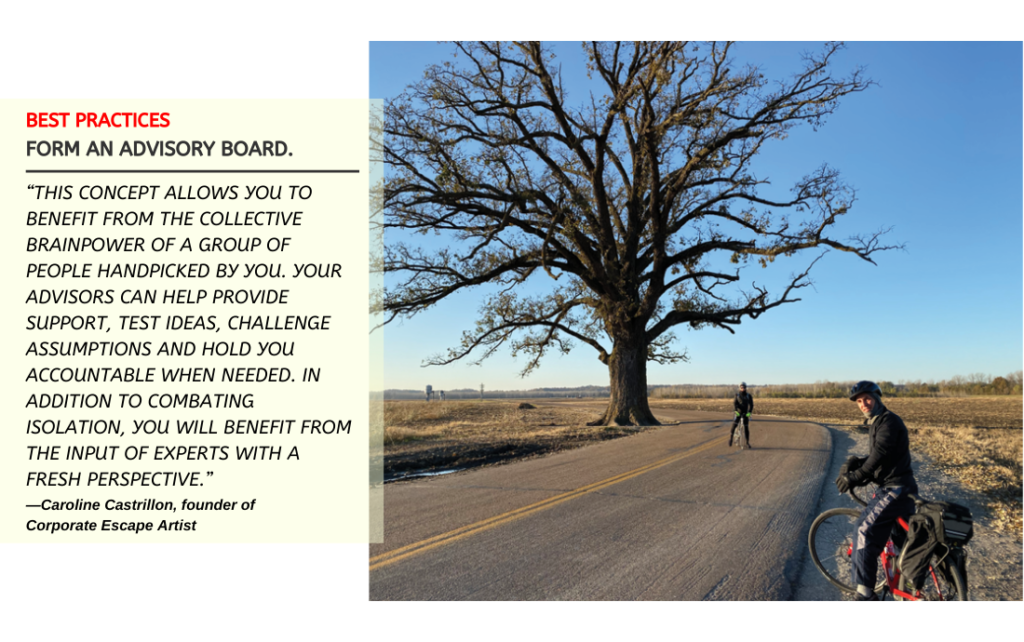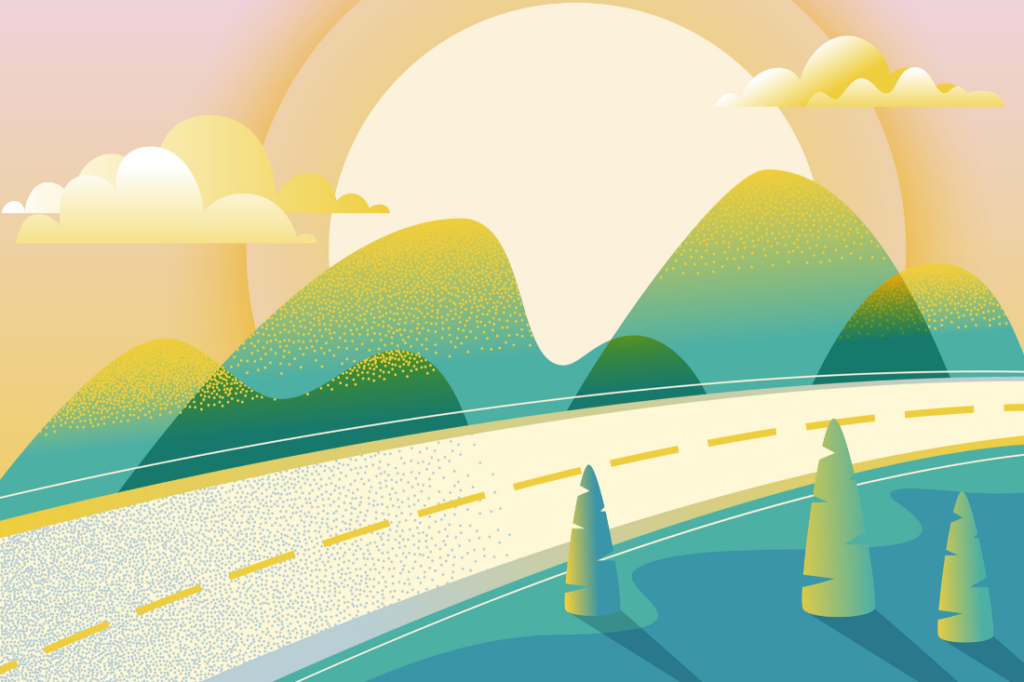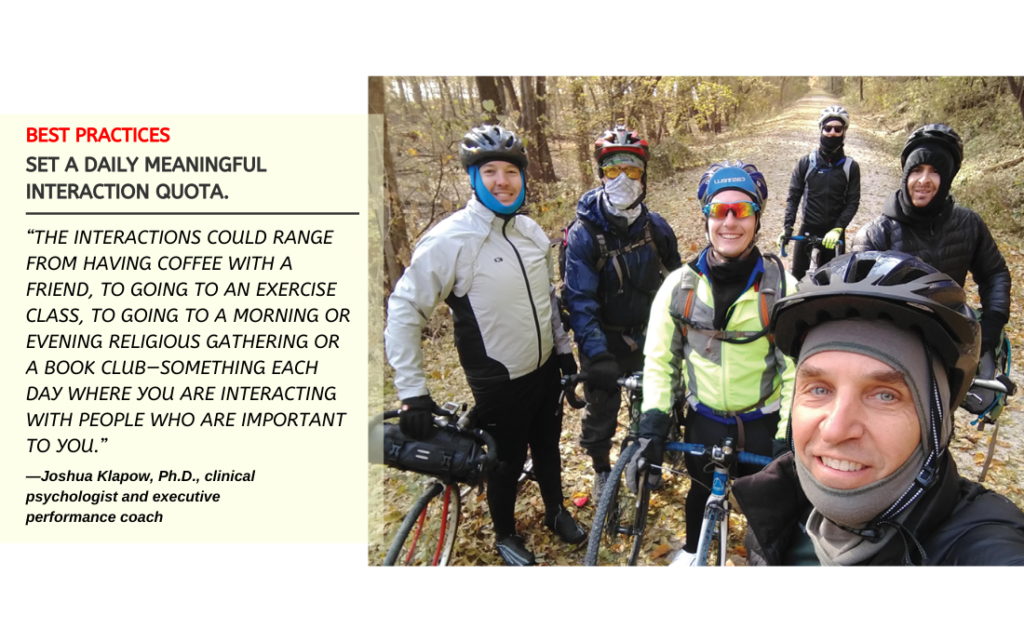The trail unspooled in front of me, dark and threatening. Towering trees lined both sides, blocking out the shine of moon, which hovered behind me. It was early evening on a Friday, when I should have been in my warm office wrapping up work for the week. Instead, I was pedaling toward the end of the second frigid day of a three-day, 267-mile bike ride across Missouri.
The thick blackness surrounding me made all my other senses more acute. Leaves crunched under my tires. I heard crackling footsteps from woodland creatures just inside the tree line. Squirrels, probably, but in another year or two they will grow into bears… giant, ferocious, man-eating bears. The chilly air nicked my cheeks, the result of cutting through a headwind with a temperature near freezing. I smiled and then laughed and then howled in delight.
Only the lamp on my handlebars illuminated the railroad converted to a bike path upon which I rode. It cast enough light for me to see exactly what I needed to see, no more and no less. Farther ahead, behind, right, left—all were shrouded in darkness. All I could do was attack the path immediately in front of me and not worry about what I couldn’t see.
Which, I think to myself, is exactly what work is like.
I’m a solopreneur. A freelancer. A member of the YouEconomy. So I know about fighting forward through the unknown even when conditions aren’t always their best. The big difference, though, between my independent, on-my-own, DIY work and the biking metaphor playing out in my head as I pedaled is that I was not alone on the trail. I had friends all around me, helping me, encouraging me, pushing me, as I did the same for them.
We were fighting loneliness, one mile at a time.
* * *
After almost seven years as a solopreneur, I doubt I’ll ever take a “real job” again. I can’t imagine going to an office when someone tells me to, sitting at the same desk all day, and leaving when that same person who told me when to come in says it’s OK for me to go home. The very idea sounds absurd, like a draconian punishment that we will eventually look back on and wonder why we allowed it to go on for so long.
As much as I don’t want to go to an office again, the freedom of the solopreneur life can come with a cost: loneliness and isolation. Stuck in my home office day after day, I miss the camaraderie of co-workers. I miss stopping by my friend’s desk, picking up the baseball bat he kept there and taking a couple practice swings. I miss impromptu lunches. I miss leaning over my cubicle to ask my friend if he can believe what the boss just said, even if I don’t miss having a boss who says things worthy of such a question.
A study in 2018 by the insurer Cigna called loneliness an “epidemic.” Nearly 50 percent of the 20,000 people who participated in the survey reported feeling lonely sometimes or all the time. I don’t know if solopreneurs suffer from loneliness more or less than the general population. But I do know that I suffer from it, and so do most of the fellow freelance writers I know, follow and read. I also know that spending most of my work days alone in my home office contributes to the problem.
My bike ride across Missouri is one way I get out of my office and fight loneliness. It was through a free men’s workout group called F3 (F3nation.com) of which I am a member. F3 workouts are outside, peer-led and constructed as if they knew I was coming, as they are designed to foster strong bonds between participants (there’s a woman’s version called FIA).
The three Fs are fitness, fellowship and faith, and for me, the second one is the most important. I don’t mean for you to read this and join your local F3 (though we’d love to have you). But if you’re struggling with loneliness and isolation, one way to fight them is to get out of your office and
do something.
My something just happens to be outdoor workouts. Yours could be a book club, sewing club, cooking club, whatever—some shared interest that puts you face-to-face with other living, breathing humans. I encourage you to form relationships around that shared interest and watch
magic happen.
Since I started working out with F3 a year ago, I’ve lost 20 pounds and gained at least that many friends. Much to my surprise, I’ve also learned or enhanced valuable skills that being a solopreneur doesn’t usually foster, including being part of a team, being a mentor/mentee, growing my accountability, responsibility and leadership skills. I’m even rediscovering the occasional usefulness of following instructions and taking criticism. All of it contributes to my fight against loneliness and isolation.
* * *
When I was in elementary school, the results of parent-teacher conferences were always the same: The teacher said I was doing fine in my subjects, but I never shut up. My dad owned a siding business and often prepared material for the next day in our garage. I would follow him out there and ask him so many questions he’d go inside and tell my mom to give me something to do so he could get work done.
The point is, I need to talk to people or I go a little crazy. Because of that, I think loneliness and isolation hit me harder than other people, and I’ve tried many ways to combat them.
Early in my solopreneur career, I organized nights out with fellow writers, and we formed what amounted to an ad hoc writers organization. I have since moved, but those meetings continue. I haven’t tried to organize similar events in my new hometown. All we talked about was work, and the conversations were almost always gripe sessions about what’s wrong with our profession. It was good to know that others struggled with the same issues I did. But I often felt just as hopeless after those meetings as I did before.
Don’t get me wrong. I think professional organizations are great. I’m in the Society of American Travel Writers and the National Motorsports Press Association, and I’m a former member of groups for baseball and football writers. But I want to be around people with different life experiences. Plus, no matter how social it is, a professional organization feels like work, and I work enough already.
I sometimes work outside of my home and should do that more often. When I have a lot of ticky-tack things to do—answering emails, invoicing, small batch reading—I take my kids to the pool or park and bring my computer. I get to play on the diving board, collect valuable Dad Time and talk to other parents while I’m there.

Yeah, I’m That Guy, the one who will talk with strangers at the coffee shop or playground. On a training ride with friends to prepare for the three-day F3 bike trip, a rider pedaling solo in the opposite direction stopped me to ask if he could join us. I liked him instantly for having the guts to do that. I said yes and struck up a conversation with him.
After that guy turned for home, a buddy on the ride said he would never ask to join another group. I said I would have had no problem doing that, and he said (paraphrasing), “Duh! of course you wouldn’t.”
My chit-chatty nature is why I don’t use shared office space locations. Well, my chit-chatty nature and the fact I’m too cheap to pay. The people unfortunate enough to sit near me wouldn’t get any work done, and neither would I.
Still, even impromptu interactions in public working environments are only temporary salves. While I may not be alone in those situations, I still feel lonely because I don’t have deep relationships with strangers I strike up conversations with like I do with my F3 friends. I work out with them at least twice a week and we talk, text and email daily. These are the kinds of deep bonds any new solopreneur would miss from the old salt mine—the kind that I encourage you to seek out if you’ve decided to join the YouEconomy.
* * *
As the miles rolled on, I thought about the difference between being alone and being lonely. We stopped mid-morning deep in a forest for a drink and to make sure we were all OK, as the temperature was in the 20s.
The six of us started the next stint riding together. Three guys set a fast pace relative to mine. After riding 77 miles the day before, we were in the midst of covering 83 miles that day and planned to conquer 107 the next, so I didn’t want to wear myself out trying to keep up with them. Nor did I want to ask them to ride slower so I could keep pace. At the same time, the other two were considerably slower than I was. I did not want to slow down for them, either. So I let the faster riders go far ahead of me and I pulled away from the slower riders.

That left me alone, but far from lonely. I knew that the men in front of me would alert me to any trail damage or detours. I knew I would do the same for the guys behind me, and they would help me if I crashed or had a flat tire. And I knew we’d all gather again at the next stopping point.
For 90 minutes, I saw no one in either direction and rode at the exact pace I wanted. It felt like my best work days, as if I had sold the perfect pitch to the perfect company for the perfect rate, and the execution worked out perfect.
As great as that was, I can only be alone with my thoughts for so long before I get bored, especially on a trip that was supposed to be about fellowship. I wanted to know if everyone else loved that section as much as I did. The difference between being alone and being lonely is having someone with whom to share the experience, whether good or bad.
And so when I saw people ahead of me, I cranked harder on the pedals. I thought my faster buddies had taken a break, or, perhaps in a bit of delusion, that I had caught up to them. I was disappointed to discover they were not my friends but strangers on a late morning ride.
I pulled alongside them and talked to them about how beautiful of a day it was, because of course I did.
Related: How to Be a Successful Solopreneur: 5 Lessons From Renaissance Festivals
This article originally appeared in the March/April 2020 issue of SUCCESS magazine.
Image by Betelgejze/Shutterstock.com





